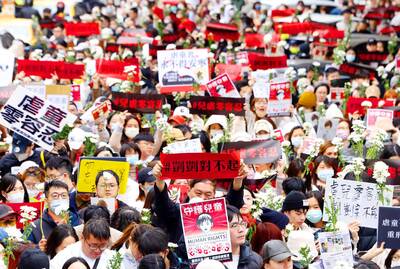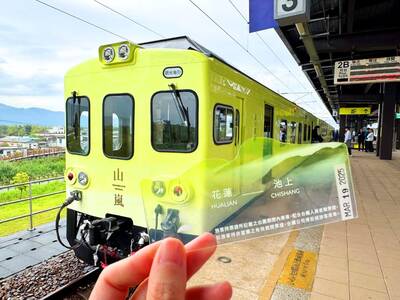President Ma Ying-jeou’s (馬英九) approval rating has dropped to 20 percent on the fifth anniversary of his first inauguration on May 20, 2008.
Critics say false promises of economic revival, flip-flop policies and concerns about his administration’s cozy relations with China have contributed to public distrust.
Having won re-election last year with 51.6 percent of the vote, Ma has failed to achieve the “6-3-3” economic goals proposed for his first term, namely 6 percent economic growth, per capita GDP of US$30,000 and unemployment of less than 3 percent.
A proposed capital gains tax on securities investments will be revised to remove the 8,500-point imposition threshold for most individual investors, while pension reforms and the controversial construction of the Fourth Nuclear Power Plant New Taipei City’s (新北市) Gongliao District (貢寮) have widened political divides and stirred social unrest, fueling public distrust of the government.
Ma has taken pride in the development of cross-strait relations over the past five years, including the signing of the Economic Cooperation Framework Agreement (ECFA) with China and enhanced cross-strait exchanges in the fields of education and culture among others. He also attributed the signing of an economic agreement with Japan and a bilateral fisheries agreement to the normalization of cross-strait relations.
However, concerns about Taiwan’s over-dependence on China remain despite Ma’s assurances that his administration has no plans for political talks with Beijing.
“Ma has lost much of his credibility over broken campaign promises and policy changes. His record-low approval rating reflects the public’s frustration with his second-term performance and it is unlikely he will be able to restore public trust in the near future,” said Ming Chuan University professor Chen Chao-chien (陳朝建).
In a poll released earlier this month by Taiwan Thinktank, a non-profit public policy research organization, Ma’s approval rating dropped to a record-low 19.1 percent, with 60 percent of respondents saying they do not expect Ma’s performance to improve during the rest of his second term.
A poll released last week by the Chinese-language United Daily News showed similar results, with Ma’s approval rating dropping to 21 percent from 23 percent at the end of his first term.
The figure was in sharp contrast with an average approval rate of between 60 percent and 70 percent following his first inauguration in 2008.
Chen said the prolonged economic slowdown and the government’s lack of resolution in pushing through reforms are key factors behind the strong public backlash.
For example, the decision to lower the threshold for the proposed capital gains tax reform, which was only introduced last year, reflected the problematic policy-making process of the Ma administration, he said. Disputes in the legislature over the bill have also caused delays to reviews of other measures, he said.
“Many of the government’s policies were steered by populism, but such flip-flopping will not save Ma from low approval ratings,” Chen said.
According to the Directorate-General of Budget, Accounting and Statistics, economic growth in the first quarter of the year was 1.54 percent, barely half of the 3.26 percent growth predicted by the agency in February.
The government expects the ECFA to promote Taiwan’s economic cooperation with other major trade partners. However, the nation has yet to sign any free-trade agreements with other nations.
Tung Li-wen (董立文) an associate professor of the Graduate School of Public Security at Central Police University and a Taiwan Thinktank consultant, said the 18 cross-strait agreements have not helped boost the employment rate or increase GDP, and the Ma administration should shoulder the blame for its inability to put agreements into practice while also being too dependent on China.
“Whether the cross-strait agreements are actually viable and will benefit Taiwan depends on China’s attitude. The Ma administration has failed to realize that it remains hard to break through our economic and trade hurdles as long as China insists on the ‘one China’ policy,” he said.
While Ma said his administration will continue to focus on economic cooperation with China, with no timetable for political negotiations, Tung said Beijing has been prepared for political talks since the Chinese Communist Party’s 18th National Congress last year.
“China is pushing ahead with its own agenda regardless of the Ma administration’s stance. The government must set up its own agenda in preparing for political talks, and address public expectations on cross-strait developments,” he said.
Political analyst Liao Da-chi (廖達琪) said the government should make greater efforts on regional peace and enhance interactions with other nations to strengthen the nation’s diplomatic relations.
Chen said the recent dispute with the Philippines over the death of a Taiwanese fisherman may boost support for Ma by rallying people against the Philippine government.
However, Taipei needs to handle the incident carefully, he said.

Taiwan yesterday condemned the recent increase in Chinese coast guard-escorted fishing vessels operating illegally in waters around the Pratas Islands (Dongsha Islands, 東沙群島) in the South China Sea. Unusually large groupings of Chinese fishing vessels began to appear around the islands on Feb. 15, when at least six motherships and 29 smaller boats were sighted, the Coast Guard Administration (CGA) said in a news release. While CGA vessels were dispatched to expel the Chinese boats, Chinese coast guard ships trespassed into Taiwan’s restricted waters and unsuccessfully attempted to interfere, the CGA said. Due to the provocation, the CGA initiated an operation to increase

A crowd of over 200 people gathered outside the Taipei District Court as two sisters indicted for abusing a 1-year-old boy to death attended a preliminary hearing in the case yesterday afternoon. The crowd held up signs and chanted slogans calling for aggravated penalties in child abuse cases and asking for no bail and “capital punishment.” They also held white flowers in memory of the boy, nicknamed Kai Kai (剴剴), who was allegedly tortured to death by the sisters in December 2023. The boy died four months after being placed in full-time foster care with the

The Shanlan Express (山嵐號), or “Mountain Mist Express,” is scheduled to launch on April 19 as part of the centennial celebration of the inauguration of the Taitung Line. The tourism express train was renovated from the Taiwan Railway Corp’s EMU500 commuter trains. It has four carriages and a seating capacity of 60 passengers. Lion Travel is arranging railway tours for the express service. Several news outlets were invited to experience the pilot tour on the new express train service, which is to operate between Hualien Railway Station and Chihshang (池上) Railway Station in Taitung County. It would also be the first tourism service

CHANGING LANDSCAPE: Many of the part-time programs for educators were no longer needed, as many teachers obtain a graduate degree before joining the workforce, experts said Taiwanese universities this year canceled 86 programs, Ministry of Education data showed, with educators attributing the closures to the nation’s low birthrate as well as shifting trends. Fifty-three of the shuttered programs were part-time postgraduate degree programs, about 62 percent of the total, the most in the past five years, the data showed. National Taiwan Normal University (NTNU) discontinued the most part-time master’s programs, at 16: chemistry, life science, earth science, physics, fine arts, music, special education, health promotion and health education, educational psychology and counseling, education, design, Chinese as a second language, library and information sciences, mechatronics engineering, history, physical education